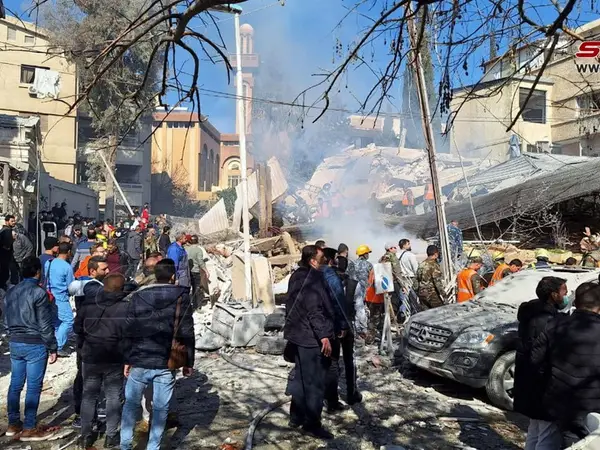Iran’s Foreign Ministry has strongly condemned a suspected Israeli airstrike Saturday, which claimed the lives of three IRGC generals and two other officers in Syria.
Blaming the strike on Israel and calling it “criminal and aggressive,” the ministry’s spokesman Naser Kanaani urged the international community and the UN Security Council “to adopt a clear stance” and condemn the attack categorically.
The Islamic Republic reserves the right to respond to the offensive “at the appropriate time and place,” he went on to say.
Earlier in the day, Syria’s state-run SANA news agency reported, “An attack targeted a residential building in the Mazzeh neighborhood in Damascus, resulting from an Israeli aggression.”
The IRGC quickly confirmed in a statement that four of its forces lost their lives in the air strikes The slain IRGC officers were named as Hojatollah Omidvar, Ali Aqazadeh, Hossein Mohammadi and Saeed Karimi. A fifth IRGC officer identified as Mohammad-Amin Samadi later succumbed to his wounds and died.
Hojatollah Omidvar, also known as Haj Sadegh and Yousef Omidzadeh, served as the head of the IRGC Quds Force intelligence unit in Syria. According to Iranian state media, Omidvar’s deputy introduced under the pseudonym of “Haj Gholam” was also killed in the attack. It is not yet clear what his real name was.
In June 2023, the Washington Post reported that Omidzadeh “identified U.S. Humvee and Cougar armored vehicles in Syria” in order to target them. According to the report, he discussed assigning operatives to take photos from the roads that US forces in Syria used.
Meanwhile, Iran’s proxies Hamas and Palestinian Islamic Jihad condemned the Damascus attack. Hamas called it “the violation of the sovereignty of an Arab state” and Islamic Jihad accused Israel of attempting to expand the scope of war in the region.
Hours after the deadly incident, Iran-backed militant groups in Iraq launched rockets at Assad Air Base in the western province of Anbar, where US forces are stationed. They sustained no serious injuries in the attack, but several Iraqi troops were wounded.
“This could be Iran’s Axis of Resistance retaliating for the earlier strikes by Israel killing IRGC officers in Syria,” Jason Brodsky, Policy Director at United Against Nuclear Iran (UANI), wrote on X.
Though the Iranian regime has avoided any direct military involvement in the Gaza war, Tehran has used its proxy groups in the region such as Houthis and Hezbollah to attack Israeli and American targets. Yemeni Houthis, in particular, have disrupted regional stability and international trade by targeting shipping lanes in the Red Sea, the Gulf of Aden, and the Bab el-Mandeb Strait.
The Iranian parliament also responded to the killings of IRGC commanders. Parliamentary Speaker Mohamad Bagher Ghalibaf warned that “a severe punishment” awaits Israel as “the warriors will certainly retaliate this crime.”
Esmail Kowsari, a former IRGC general and member of parliament’s National Security and Foreign Policy Commission, confirmed that the whereabouts of the slain commanders in Syria were identified. Kowsari called for the arrest of “spy agents” in Damascus, adding that Israel has had “agents” in Syria, Lebanon and other neighboring countries since the past.
In December, Razi Mousavi (aka Seyyed Razi) was killed in an alleged Israeli airstrike near Damascus. He headed IRGC’s ‘logistics’ and military coordination in Syria, getting weapons for and coordinating Iran-backed forces in Syria and Lebanon.
The Islamic Republic has repeatedly threatened Israel with severe punishments over its alleged role in the killings of IRGC commanders and forces in the region. However, Tehran has refrained from a direct attack against Israel.
Earlier in the week, the IRGC attacked Iraq’s Kurdistan region in what it called an attempt to target Israeli agents. Iran’s missiles hit a civilian house in Erbil belonging to Peshraw Dizayee, killing him and 4 members of his family. Dizayee was a business mogul and head of Falcon Investment Group. Following the raid, IRNA, the Iranian state news agency, released a report that accused Dizayee of collaborating with Israel. Kurdistan officials and the Iraqi government have both rejected the allegation.
